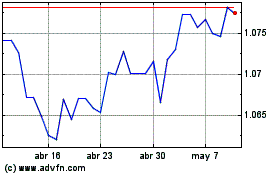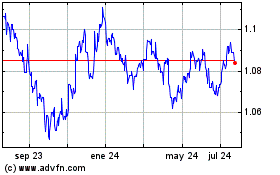U.S. Dollar Extends Rise Amid Declining Prospects Of U.S. Fed Rate Cut, Middle East Tensions
02 Octubre 2024 - 9:13PM
RTTF2
The U.S. dollar continued to trade higher against other major
currencies in the Asian session on Thursday, after data showed that
the stronger-than-expected U.S. private sector employment data
dimmed prospects of aggressive rate cuts by the U.S. Fed.
Data from payroll processor ADP on Tuesday showed that private
sector employment climbed by 143,000 jobs in September after rising
by an upwardly revised 103,000 jobs in August.
Traders remain cautious about escalating tensions in the Middle
East following Iran's ballistic missile attack against Israel and
await key U.S. data for additional clues on the Fed's rate
trajectory.
Multiple airstrikes were reported in Beirut earlier today with
explosions heard in the Lebanese capital. Authorities said at least
six people were killed.
Amid West Asia conflict escalation, several countries have
issued advisories, and some have evacuated their citizens.
The U.S. Labour Department is due to release its more closely
watched report on employment for September on Friday. Economists
currently expect the report to show employment climbed by 140,000
jobs in September after an increase of 142,000 jobs in August. The
unemployment rate is expected to hold at 4.2 percent.
Trading later in the day may be impacted by reaction to the
latest U.S. economic data, including reports on weekly jobless
claims, service sector activity and factory orders.
The safe-haven dollar started to trade higher against its major
counterparts from last Friday.
In the Asian trading today, the greenback advanced to nearly a
1-1/2-month high of 147.24 against the yen, from Wednesday's
closing value of 146.46. The next possible upside target for the
greenback is seen around the 151.00 region.
In economic news, the services sector in Japan continued to
expand in September, albeit at a slower pace, the latest survey
from Jibun Bank revealed on Thursday with a services PMI score of
53.1. That's down from 53.7 in August, although it remains above
the boom-or-bust line of 50 that separates expansion from
contraction. The data also said the composite PMI slipped to 52.0
in September from 52.9 in August.
Japan's newly appointed Prime Minister Shigeru Ishiba said that
the nation is not prepared for additional rate hikes, following a
meeting with the central bank governor.
The greenback rose to a 3-week high of 1.1032 against the euro
and a 1-week high of 0.8511 against the Swiss franc, from
yesterday's closing quotes of 1.1045 and 0.8497, respectively. If
the greenback extends its uptrend, it is likely to find resistance
around 1.09 against the euro and 0.86 against the franc.
The greenback edged up to 1.3245 against the pound, from
yesterday's closing value of 1.3267. On the upside, 1.30 is seen as
the next resistance level for the greenback.
Against Australia, the New Zealand and the Canadian dollars, the
greenback advanced to a 2-day high of 0.6860, nearly a 2-week high
of 0.6236 and a 2-day high of 1.3524 from Wednesday's closing
quotes of 0.6884, 0.6262 and 1.3501, respectively. On the upside,
0.67 against the aussie, 0.61 against the kiwi and 1.36 against the
loonie are seen as the next resistance levels for the
greenback.
Looking ahead, Switzerland CPI data for September is due to be
released in the pre-European session at 2:30 am ET.
In the European session, PMI reports from various European
economies and U.K. for September and Eurozone PPI data for August
are slated for release.
In the New York session, U.S. weekly jobless claims, Canada and
U.S. PMI reports for September and U.S. factory orders for August
are set to be released.
Euro vs US Dollar (FX:EURUSD)
Gráfica de Divisa
De Oct 2024 a Nov 2024

Euro vs US Dollar (FX:EURUSD)
Gráfica de Divisa
De Nov 2023 a Nov 2024
